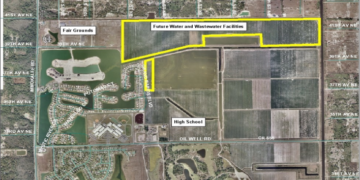The Florida Legislature passed several bills this session that strengthen developer rights but weaken local control over planning and zoning decisions. The result: Residents of beachside communities and other Southwest Florida cities and towns will have less time and fewer legal tools to block construction projects and developments that don’t fit the character of their neighborhoods.
That’s OK with developers, as legal challenges—which can ruin their ability to secure financing—can last for years. Planning objections can lengthen project timelines, reducing profit as inflation raises the cost of everything from building materials to skilled labor to insurance.
Trachtenberg: Preemption leads to chaos
The weakening of home rule began with vacation rentals, said Joe Trachtenberg, the former head of Collier County’s Affordable Housing Advisory Committee. He advocated for lower-cost housing for teachers, police, health care workers and other mid-level professionals for years until the county commission ousted him this spring, ostensibly because he took his complaints of the commission’s alleged nonaction to the public.
Weakened home rule leads to chaos, he said. “The trend in our state Legislature of superseding local government rule has generally been very wrong,” Trachtenberg says. “For example, not allowing individual cities and counties to manage vacation rentals in their communities has created needless turmoil. Individual homeowners now have little control over adjacent ‘party palaces’ rented to large groups with virtually no controls. Airbnb and Vacation Rentals by Owner, or Vrbo, are nightmares in many neighborhoods.”
 Jane West, policy and planning director of the nonpartisan 1000 Friends of Florida, said the new laws will be tested in the next months. “Local governments got preempted left and right; they have completely taken away home rule,” she says. “We’ll have to battle these in the courts.”
Jane West, policy and planning director of the nonpartisan 1000 Friends of Florida, said the new laws will be tested in the next months. “Local governments got preempted left and right; they have completely taken away home rule,” she says. “We’ll have to battle these in the courts.”
Here’s a list of the laws that opponents say will dilute local control over land use, water quality, environment and other things subject to home rule.
SB 170/HB 1515: Local Ordinances
The Florida League of Cities—representing Florida’s more than 400 villages, towns, and cities that practice home rule—sees SB 170 as the mother of all local preemption bills.
Backers of SB 170—including Senate President Kathleen Passidomo of Naples—believe the problem is the patchwork of rules, regulations and ordinances in those hundreds of municipalities. Developers also believe it should not be easy for a few “unreasonable” people on local planning boards to nix multimillion-dollar projects that have the approval of other stakeholders.
The new law says local governments must halt the enforcement of an ordinance if a single lawsuit challenges that law or ordinance. Repeat: That rule or law can be immediately suspended as the objection to the law makes its way through the court.
The law also allows developers to recover attorney fees and costs from municipalities if they win lawsuits or challenges against local zoning disputes. That makes it less likely that smaller local governments will spend the money to fight business interests, West said.
Those who oppose the bill point to Sanibel Island as proof that home rule can work if citizens and leaders are not abusing local authority. The barrier island incorporated in the mid-1970s, but after this bill passed May 3, local control could be tested as developers submit plans to build or rebuild on Sanibel post-Hurricane Ian.
SB102/HB627: Affordable Housing (Live Local)
The bill provides up to $811 million to fund such state affordable housing programs as the State Housing Initiative Housing Program, State Apartment Incentive Loans and Hometown Heroes. It also creates new property tax exemptions for new or rehabilitated affordable housing units, and provides other financial incentives for developing affordable housing.
On the other hand, it would preempt local government limits on height and density in commercial and mixed-use zones, and suspend any requirement for zoning changes or comprehensive plan amendments. It would also prohibit local governments from imposing rent control under emergency declarations—or any other circumstances.
The Florida Chamber of Commerce backed this bill because “it is essential to have affordable workforce housing to ensure Florida’s workforce can ‘live local’ in the communities where they work,” says Florida Chamber CEO Mark Wilson. “The passage of this legislation will ensure Floridians can live closer to their jobs, schools and health care and still remain within their household budgets.”
Trachtenberg, who as an affordable housing official complained about a lack of action by Collier County, likes the incentives in this bill. “In this one case, I applaud the state for recognizing the failings of local leadership, and for imposing requirements that will actually benefit everyone,” he says.
By preempting local government limits on height and density, the bill frees up developers to build less-expensive housing.
“We have a critical shortage of over 10,000 affordable units in Collier County,” Trachtenberg says. “The only way we will make a dent in this crisis is with more density and height.”
SB 540/HB 359: Local comprehensive plans
According to environmentalists and planning officials, this bill “sounds the final death knell” on planning-related legal challenges. It was introduced by Rep. Wyman R. Duggan, a Jacksonville lawyer who specializes in defending developers against land use, zoning, permitting and developmental challenges. He believes developers too often get stuck with hundreds of thousands of dollars and more in legal bills.
His bill, now a law, allows prevailing parties to recover attorney fees in challenges to comprehensive plans and plan amendments. If developers win a battle to obtain variances, for instance, local residents will have to pay the legal fees of deep-pocketed developers. The same goes for local governments if they lose to developers.
“This would deal a devastating and permanent blow to effective citizen engagement in Florida’s community planning process by threatening ordinary citizens with paying the attorney fees and costs of local governments and developers,” says West, whose nonpartisan organization lobbied against this and other 2023 bills.
SB 540 could turn local residents into bystanders during planning debates, she said: “It prevents enforcement of local growth plans created with citizen input and adopted by their elected representatives, and paves the way for environmentally irresponsible sprawl.”
 SB 1604/HB 439: Land use and development regulation
SB 1604/HB 439: Land use and development regulation
This law requires the local government to accept the decision of a special magistrate during the Florida Land Use & Environmental Dispute Resolution process. It also ends local government’s ability to deny zoning changes because there aren’t enough roads, schools or other infrastructure to support the development.
“This change to the law creates a path to circumvent local government decision-making,” West says. “But that path is only available to landowners—not to business owners, not to neighboring landowners, not to adjacent local governments.”
The law also does not require a special magistrate to be an attorney or to be a professional planner, which potentially paves the way for political magistrate appointments. “The chance is great that the special magistrate may misunderstand basic and important issues related to the law or to land development,” she says. “Automatically applying a special magistrate decision with no further local government decision will create due process problems.”
On May 18, the Legislature introduced the Affordable Housing Approval Process amendment, which allows for a free pass for developing land—regardless of its land-use designation—if it is adjacent to property that is being developed with 25% of affordable housing units. The amendment failed, according to West.
An amendment that takes away a municipality’s ability to determine where electric substations can be built did survive, however. The amendment gives utilities the ability to locate large electrical substations in every land-use category except for historic preservation, conservation or preservation.
 SB 1346/HB 1317: Local regulation of unsafe structures
SB 1346/HB 1317: Local regulation of unsafe structures
This is of great importance to Fort Myers, Captiva, St. James City, Seaside, Marco Island and other Southwest Florida beachfront towns hit by Hurricanes Ian and Irma and future storms. SB 1346 overrides local government limits on demolishing structures in flood zones that don’t meet new construction standards and/or would be considered “nonconforming” or “unsafe,” West said. The bill would also override any local decisions on what to replace them with. The law excludes single-family homes and structures listed in the National Register of Historic Places.
“It would prohibit local governments from blocking the demolition of any building, with some exceptions, that are at least in part ‘seaward of the coastal construction control line,’” West says. This puts residents of seaside condos and other rental structures in danger of being evicted should the property owner be forced to demolish the buildings. They could sell the property to a developer who will tear it down for their own projects, she said.
“That puts renters at the whim of the property owners who may choose to cash in by selling the property to a developer, who can demolish the structure without facing any objection by the local government,” West says. “Once demolished, towns and counties would be banned from having any say whatsoever on what would be built next, including high-rise, high-density property.”
Local control since Colonial times
Developers especially don’t like it when a town or municipality kills a project after the builder has invested tens of millions of dollars buying the land and paid for preconstruction costs, such as engineering and environmental studies.
In 2018, Crocker Partners, or CP Group, sued Boca Raton for $137 million in damages after the city voted down its 2,500-condo mixed-use project years after the city initially approved it. The company said the city’s vote reduced the value of the land it bought for the project, as well as the value of properties the company owns nearby.
Local governments, however, have had the right to determine the shape of their communities since the founding of this country. The Philadelphia Plan of 1686 introduced the gridiron street system, uniform spacing and setbacks for buildings that other American towns quickly adopted. Yet Philadelphia is an entirely different town than New Orleans by temperament and feel—the result of local citizens guiding local planning.
Proponents of local, or home, rule believe this year’s preemption bills will quickly erode the architectural individuality of local communities. “Florida’s unique coastal communities, like Sanibel, Marco Island and Fernandina Beach, are special places because of the ability of local government to be responsive to the vision of the residents of their community,” West says.





